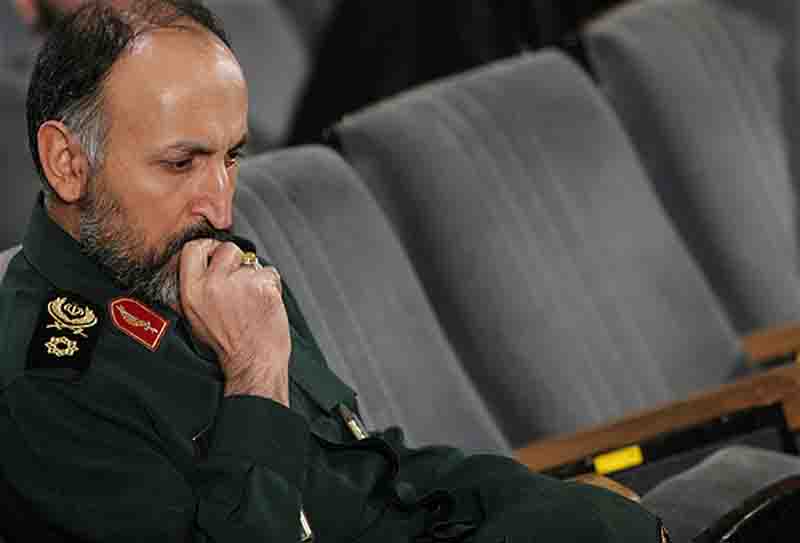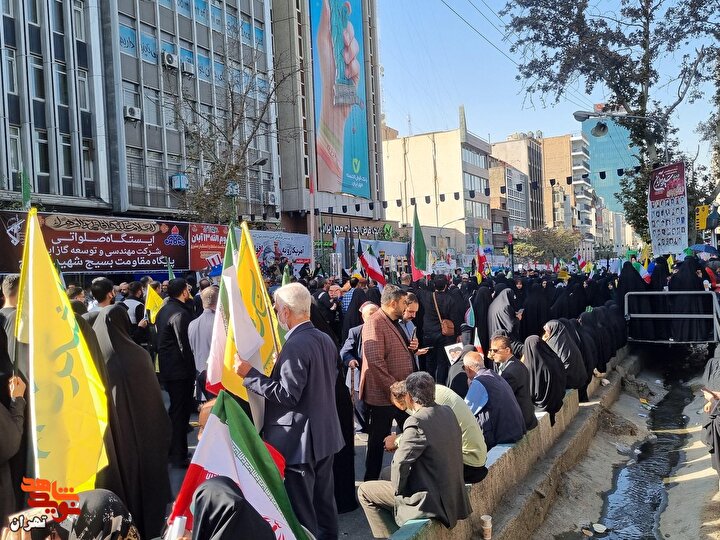
Inattention to Sacred Defense Cinema, Forsaking National Identity
TEHRAN, (SCIB) - “Inadequate attention to sacred defense cinema is forsaking one’s national identity,”? said Commander Hejazi, Basij commander in chief, in the tribute ceremony of sacred defense Film makers.

TEHRAN, (SCIB) - “Inadequate attention to sacred defense cinema is forsaking one’s national identity,”? said Commander Hejazi, Basij commander in chief, in the tribute ceremony of sacred defense Film makers. Mohammad-Hossein Saffar-Harandi (Minister of Culture and Islamic Guidance), Jaffari Jelveh (deputy Minister of cinema affairs), Mohammad- Reza Sharafoldin (head of the Association of Sacred Defense Cinema) and many sacred defense filmmakers attended the ceremony which took place on Sunday, March 11th. The ceremony then turned into a tribute to Rasoul Mollaqolipour. After critic Akbar Nabavi’s speech, interviews with Mollaqolipour were played along with backstage footage of some of his films. Khosrow Sinayee was the ceremony’s first speaker who talked about his mutual memories with Rasoul Mollaqolipour. “My first encounter with Rasoul goes back to a film festival in Kerman. We happened to sit at one table and started talking. He told me, “You know what our problem is? We think you wear Western clothes and sit in cafes and talk about intellectual stuff and you think we are aliens always wrapping bombs around our waist.”? Sinayee continued, “I told him that we are all Iranians and if we accept this fact, we can get along much better.”? “Like a story”? director went on to relate his second memory of Mollaqolipour, “Many years later we were both selected as members of the board of judges of Fajr Film Festival, I was afraid we would run into complications because we weren’t very like-minded. Later I heard from him that he also had the same worry. But the result was contrary to what we had thought. When Rasoul fell sick and couldn’t make it to the voting day, he said his opinion is exactly as Sinayee would say.”? After Sinayee’s talk , Akbar Nabawi invited Mr. Jaffari Jelveh , Commander Esbati and Mohammad-Reza Sharafoldin on stage to pay tribute to Mollaqolipour’s wife and Manouchehr Mohammadi, producer of “M like Mother”?. Manouchehr Mohammadi said, “Rasoul would always come to office at 11 am and was always so energetic and lively that everyone would know of his presence before he had even entered. Today I went to office after a few days and waited for him, but he never showed up.”? Mohammadi then read out the final sequence of “Evening of the 10th Day”? to the audience. After Mohammadi’s talk Seyyed Javad Hashemi went on stage and said “Rasoul started filmmaking in battlefields. He went to Khorramshahr at the beginning of war and was one of the last people to leave that city after its occupation. He recorded the resistance or Iranians in his films. He will always be alive because art lives forever. The ceremony’s next speaker, Commander Hejazi said “My acquaintance with Rasoul dates back to the time where he was making short films in Kordestan. He never gave up his goals and always made innovative films.”? Hejazi pointed to the sacred defense cinema and said, “The sacred defense belongs to all Iranians and is a national treasure which we should guard and anybody who is negligent in this regard has forsaken his national identity.”?
TEHRAN, (SCIB) - “Inadequate attention to sacred defense cinema is forsaking one’s national identity,”? said Commander Hejazi, Basij commander in chief, in the tribute ceremony of sacred defense Film makers. Mohammad-Hossein Saffar-Harandi (Minister of Culture and Islamic Guidance), Jaffari Jelveh (deputy Minister of cinema affairs), Mohammad- Reza Sharafoldin (head of the Association of Sacred Defense Cinema) and many sacred defense filmmakers attended the ceremony which took place on Sunday, March 11th. The ceremony then turned into a tribute to Rasoul Mollaqolipour. After critic Akbar Nabavi’s speech, interviews with Mollaqolipour were played along with backstage footage of some of his films. Khosrow Sinayee was the ceremony’s first speaker who talked about his mutual memories with Rasoul Mollaqolipour. “My first encounter with Rasoul goes back to a film festival in Kerman. We happened to sit at one table and started talking. He told me, “You know what our problem is? We think you wear Western clothes and sit in cafes and talk about intellectual stuff and you think we are aliens always wrapping bombs around our waist.”? Sinayee continued, “I told him that we are all Iranians and if we accept this fact, we can get along much better.”? “Like a story”? director went on to relate his second memory of Mollaqolipour, “Many years later we were both selected as members of the board of judges of Fajr Film Festival, I was afraid we would run into complications because we weren’t very like-minded. Later I heard from him that he also had the same worry. But the result was contrary to what we had thought. When Rasoul fell sick and couldn’t make it to the voting day, he said his opinion is exactly as Sinayee would say.”? After Sinayee’s talk , Akbar Nabawi invited Mr. Jaffari Jelveh , Commander Esbati and Mohammad-Reza Sharafoldin on stage to pay tribute to Mollaqolipour’s wife and Manouchehr Mohammadi, producer of “M like Mother”?. Manouchehr Mohammadi said, “Rasoul would always come to office at 11 am and was always so energetic and lively that everyone would know of his presence before he had even entered. Today I went to office after a few days and waited for him, but he never showed up.”? Mohammadi then read out the final sequence of “Evening of the 10th Day”? to the audience. After Mohammadi’s talk Seyyed Javad Hashemi went on stage and said “Rasoul started filmmaking in battlefields. He went to Khorramshahr at the beginning of war and was one of the last people to leave that city after its occupation. He recorded the resistance or Iranians in his films. He will always be alive because art lives forever. The ceremony’s next speaker, Commander Hejazi said “My acquaintance with Rasoul dates back to the time where he was making short films in Kordestan. He never gave up his goals and always made innovative films.”? Hejazi pointed to the sacred defense cinema and said, “The sacred defense belongs to all Iranians and is a national treasure which we should guard and anybody who is negligent in this regard has forsaken his national identity.”?



